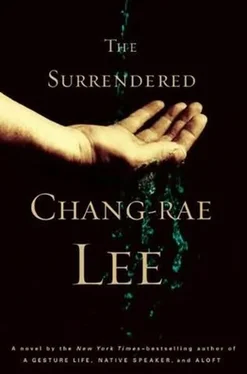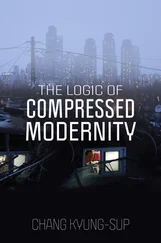“You can have it,” she told him. “I don’t care.”
“I don’t want it,” he replied. “I don’t want anything anymore.”
“I brought you water.”
She gave him the ladle and he drank half of it, saving her the rest. She took a sip and offered it back and he finished what was left. Then, with a surprising indifference, he threw the ladle into the stove. It was not worth ten grains of rice, but like many things in the orphanage it was a shared object and therefore of communal value, and the ease with which he tossed it in startled her. They watched it closely. The ladle was waterlogged and at first it only hissed but soon the twining and edges began to burn, smoke starting to billow from the bamboo cup, gathering beneath the long handle, and then in a whoosh it was aflame, its light hot on their faces. Min got up and left. When he returned he was carrying two of the small footlockers. One was his, the other June’s-he had stolen into the girls’ side. He opened the lid of his locker and began taking out the few items it contained, inspecting them for a moment and then tossing them into the stove. She did not say anything or try to stop him. He started with his box of pencils, and then a deck of Korean playing cards, and then he put in two special pairs of dress socks that he’d received from a church group in America. Next were some letters and greeting cards from the same people. Then he drew out the fine scarf he had made; aside from his everyday clothes, it was the last thing he had. He handed it to June to put in the fire, and after he nodded to say it was all right, she balled it up and dropped it in. It burned not quickly but rather steadily and well, the fire consuming it with its own slow savor.
“You want to try?” he said. “It feels good.”
June opened her footlocker. One by one she began tossing in her possessions, which were nothing at all, letting Min throw in every other, a straw doll she had never played with and old magazines and a yellow summer dress that she had worn only once and knew now she would never wear again. The fire flared with each item and they had to lean back from the blasts of heat. The last thing of June’s was not in her footlocker but on the pew, beside Min, and he picked it up now, the little book. “How about this?”
She regarded it for a long moment. “Okay,” she said.
“Are you sure?”
“Yes,” she told him. “Put it in.”
Min leaned in toward the stove, one hand shielding his face. He then flipped it into the seething vault. It lay on the coals, its cover pristine and cool blue. It appeared as though nothing would happen, that it was miraculously immune to their private inferno. And then she knew how wrong she was to give it up. She was wrong to ever let it go. There were things not bound for oblivion. But all at once the book was in flames, blazing as brightly as anything gone in so far, and without hesitation June reached deep into the stove and grabbed at the heart of the fire.
“Noo-nah!” Min gasped, trying to pull her back. “Noo-nah!”
There was pain at first, pain so sharp and great and pure that for a moment June felt that she had become the burning itself, that she was the crucible and not the iron, and as she grasped the book a lightning flashed into every last part of her. She fell back onto the floor, Min immediately snuffing her hand and the book with the blanket. He was frantic because she would not let it go, and when the flames were finally out he was crying at the sight of her hand and arm. The horrid, bubbled skin was like half-molten, bloody wax. But to June it belonged to someone else, for there was no feeling at all, the nerves seared dead up to her elbow. It was the untouched rest of her body that was shuddering, as if buffeted by the wake of all the phantom pain from her hand. Yet her mind was clear.
“Somebody must help us!” Min said, panicking. “I’ll go get Mrs. Tanner!”
She told him no. He was frantic but she calmed him with an embrace. They were on their knees. She let him go and the boy sat on his haunches. She reached for the big oil lamp that she had fetched from outside. It was still quite heavy with fuel. She gave it to him and he hefted it from the bottom; he knew what she wanted him to do. He threw it into the stove, the glass globe shattering without much sound. June shut the hearth door, neither of them moving back. Min hugged her tight now. She was still holding the book, its cover charred but the inner pages still intact, and she could smell the smoke and her ruined skin as she wound her arm around his neck. She thought she heard voices outside but it was too late. She kissed him on the cheek.
“We don’t need anyone,” she said softly in his ear. “We’re going to stay here now.”
SHE KEPT TALKING about la chiesa dell’ossario . The Chapel of Bones. She was still flush with the double dose Hector had given her, riding in the splendid chariot. The three-hour drive had taken nearly five because of jammed traffic and then getting lost several times, Hector having to pull over and check the map himself. June was no longer able to help him. There was a question as to what she could even see, her eyes opaque and darkened, the color of muddy coffee. But they were close now, ascending the road to the village on the next hill, and as if she knew they were making the last approach, she was preparing herself, reviewing. She had not been to this place before but she spoke as if she had seen it many times, as might a guide, telling him how the church was consecrated in 1870 as a reliquary of the fallen soldiers of the Battle of Solferino. It was the simplest church, nothing about it ornate, the only spark of color on the cream-and-white façade a mural of Saint Peter in a blue robe, a red shawl about his shoulders, a golden halo encircling his somber head. She said he would know it by this. But the car had sounded funny in the last half-hour, and now something was clattering in the undercarriage, and as Hector careened ponderously on the steep curves banking up the hill, he wondered if this last effortful stretch would prove its demise. He shifted to a lower gear and lurched the rest of the way, the heaving strain of the motor shaking the tinny sedan, and when he looked in the rearview mirror he saw her slumped against the door, her face pinched up as if she were tasting something bitter. The road widened on a plateau and he stopped across from a small hotel whose patio and cocktail tables were set practically onto the pavement. He was simply going to park, to give the machine a moment’s rest, when to his right he saw the church. It shined starkly in the late-afternoon light. It stood atop a brief rise of land opposite the old hotel, a wide gravel walking path lined with cypress trees leading up to its dark wooden doors. Above the doors was the figure of the saint, his colors just as June had described.
“Look,” he said to her. “Up there.”
But now, in the lee of the drug rush, she was too weak even to turn her head. Her color was ghastly.
“Is your back hurting again?”
“I want to lie down,” she said breathily, talking through her teeth. “I want to lie down right now.”
He was going to circle tightly in the wide street and let her off in front of the hotel, but when he tried the ignition it cranked and cranked, and then it simply clicked. Finally it didn’t even click anymore and he told her to hold on and he walked across to the hotel and arranged for a room. When he returned she was nearly passed out and he had to catch her head as he opened the rear passenger door so that she wouldn’t tumble out. He lifted her and held her as several cars and scooters passed, one of them peppering its horn at them. He bristled until he realized they were probably being taken for newlyweds. The honking startled her and she gazed at him as if waking from a long and restful sleep, craning her neck back before resting her cheek on his shoulder, happy to be once more cradled in his arms. And yet he wasn’t completely sure she recognized him. The elevator was out of order and so he carried her up the four flights of stairs to a room in the tower, led by the manager of the hotel, a gaunt-faced young man in a crimson tracksuit. He let them into a large spartan room with two double beds and an armoire with one of its doors detached and leaning up against its front. There were large armchairs in the corners, placed, it seemed, more for the inhabitants’ punishment than comfort. But the main feature of the room was its tall, large window, which framed perfectly the church on the hill. The manager pointed it out in Italian and broken English, obviously accustomed to hosting its visitors.
Читать дальше











